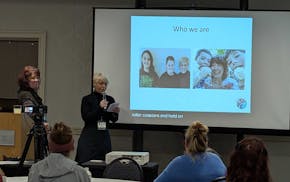Does your writing voice differ from your personal voice?
How do you come across as a manager, colleague or team member when you write?
Do you project an image of a competent, decisive, fair-minded, approachable person, or do you come across as impatient, disorganized, careless and distant? Are you modeling the kind of writing you expect from others? Are you setting high standards or low standards for those who work with you and for you?
Underlying these questions is a more fundamental and interesting one: Are you the same person in writing as you are in person? In most cases, the answer is probably no.
In writing, you have the opportunity to be more organized, thorough and logical, perhaps even livelier, funnier and more entertaining, than you are in real life. When you write, you assume a voice, you adopt a pose, sometimes as part of your persuasive strategy, at times to create a certain tone and at other times to make a point with particular emphasis.
But sometimes, perhaps frequently, you dash something off under the pressure of deadlines or workflow without taking time to consider your tone, organization, clarity and persuasive strategy. Or to proof read for distracting errrors. (Not counting the intentional sentence fragment, did you catch the two proofreading errors in that sentence?) And in those hurried messages you might be projecting an image of yourself that undermines your credibility.
Whether you're careful or careless, fundamental to the writer-reader relationship is the writer's voice, the person behind the words. Here are three things you can do to ensure that your voice projects the image you desire:
1. Read your old messages in your outbox to check for tone. How are you coming across to your reader? Are you routinely opening and closing with goodwill statements? Are you opening with "As per your request, attached please find …" or "Thank you for your interest in our organization. The attached information will answer your questions"?
2. Check your messages for organization and clarity. As I've advised in past columns, in addition to those goodwill statements, take a three-step approach to presenting your information: purpose, background, proposed action. (Google "Wilbers messages.")
3. Proofread. Look for common errors. Double-check your figures, dates and names. (You'll find multiple resources by googling "Wilbers editing checklists.")
Finally, ask yourself, what kind of person are you, and what kind of person do you aspire to be?
"At its best, your writing should convey a sense of your individuality, your humanity and your warmth," I wrote in one of my books. "Communication goes deeper than language. It goes to the heart of human interaction. To write with a sense of humanity is to recognize writing as a personal transaction between writer and reader. Your reader should never be allowed to forget that behind your words, behind this artifice of language, is a real person, an authentic human being."
In other words, reveal not just your thoughts, but also your values and feelings. What kind of world do you want to live and work in? Is your voice contributing to your vision?
Stephen Wilbers offers training seminars in effective business writing. E-mail him at wilbe004@umn.edu. His website is www.wilbers.com.

U.S. Bancorp executive stopped responding to control tower minutes before Brooklyn Park crash

Minneapolis condo in historic Midtown Exchange building listed for $205,000

RFK Jr.'s controversial comments draw ire at Minnesota autism convention

Big medical expenses drove $176 million operating loss last year at Medica

